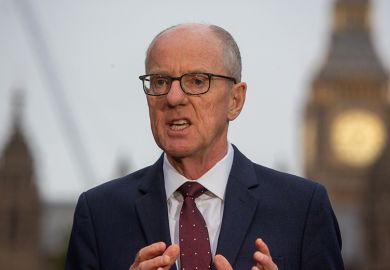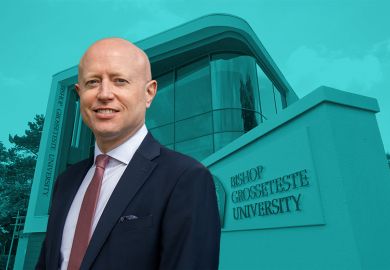Troubled: Sir David Bell worries that ‘university courses that have trained high-quality teachers are being choked off’
The vice-chancellor who was chief civil servant to Michael Gove, the education secretary, has called the scaling-back of university teacher training “perverse” after another huge drop in provisional student places for next year.
Sir David Bell, vice-chancellor of the University of Reading and former permanent secretary to the Department for Education, made the comments after the release of the allocations for initial teacher training places for 2014-15 by the National College for Teaching and Leadership. The number of places allocated to higher education institutions has fallen by 3,800, a decline of 14.5 per cent.
By contrast, the number of places for the government’s flagship School Direct programme – where trainees are recruited directly by schools – has risen from about 9,600 to 15,400, more than a third of the total.
This comes despite claims that School Direct recruited less than 50 per cent of its national target in the 2013-14 recruitment cycle, according to an analysis of the figures.
“It is perverse that university courses that have trained high-quality teachers for years are being choked off,” said Sir David, who left the DfE at the end of 2011. “It is fine to create a range of training routes, but not at the expense of good, proven providers.
“We’ve seen unfilled School Direct places not being reallocated to universities: that kind of attitude is terribly puzzling and troubling.”
Sir David’s views were shared by many in the sector, who have warned that it may be difficult for some universities to sustain initial teacher training after being hit by a large reduction in places this academic year.
“The national picture is bleak…with many ‘good’ providers losing significant numbers to School Direct and in some cases whole subject areas,” said Andy Jones, pro vice-chancellor for learning innovations and dean of Manchester Metropolitan University’s Faculty of Education. “If School Direct continues to under-recruit, we will be facing a very likely teacher shortage beyond 2014.”
Mr Jones said that maintaining core provision through universities would be the wisest strategy to avoid potential shortages, but the government “has chosen not to do this”.
Besides losing their core teacher training places, some institutions have also been faced with shortfalls in their School Direct numbers, where they partner with schools to train teachers.
Kevin Mattinson, pro vice-chancellor (community and partnerships) and head of teacher education at Keele University, said that the under-allocations in School Direct were jeopardising partnerships between universities and schools.
Keele submitted a request for 35 School Direct places in English and for history.
“For English, I’ve been allocated four; for history, I’ve been allocated five,” he said.
“We’ve already had one school getting quite upset, saying: ‘Keele never told us there was a problem with our bid.’ We didn’t know there was any problem with bids. We knew we might not get all the numbers, but the schools are shocked. It puts new pressure on partnerships between schools and institutions.”
Register to continue
Why register?
- Registration is free and only takes a moment
- Once registered, you can read 3 articles a month
- Sign up for our newsletter
Subscribe
Or subscribe for unlimited access to:
- Unlimited access to news, views, insights & reviews
- Digital editions
- Digital access to THE’s university and college rankings analysis
Already registered or a current subscriber?




